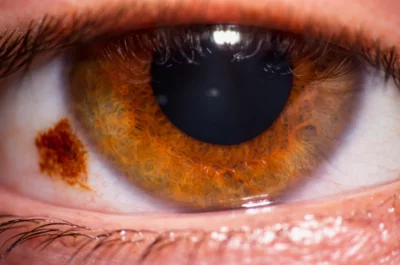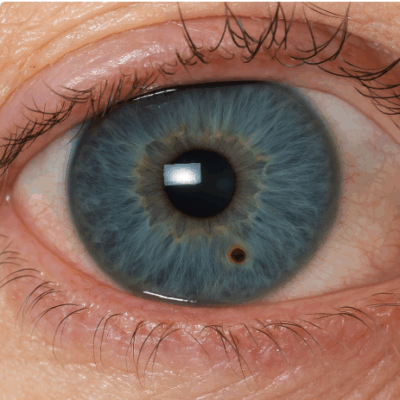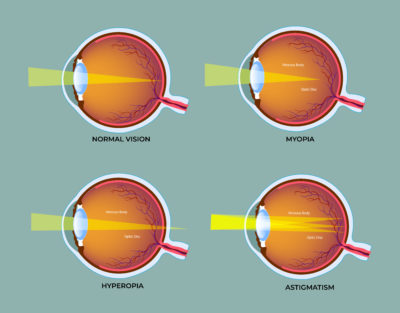Eye floaters are small shapes or spots drifting in vision that many people describe as cobwebs, squiggly lines, or dots. While usually harmless, they can sometimes signal underlying retinal or vitreous problems.
Understanding the eye floaters treatment options, causes, and when to seek medical help is essential for protecting eye health. This article covers causes, available therapies, complementary approaches, and lifestyle measures for prevention.
Understanding Eye Floaters
What Are Eye Floaters?
Eye floaters are specks or thread-like shapes that appear to move with your eyes and drift when you try to look at them directly. They are often noticed against bright backgrounds like blue skies or white walls.
Common eye floaters symptoms include cobweb patterns, dark dots, and translucent strands. For patients asking what are eye floaters or eye floaters meaning, they are shadows cast on the retina by debris in the vitreous gel.

How the Eye’s Vitreous Gel Changes Over Time
The vitreous is a clear, jelly-like substance filling the inside of the eye. With age, it liquefies and contracts, causing collagen fibres to clump together, which results in floaters.
People over 50, those who are nearsighted, or those with a family history of retinal tears are more prone. These vitreous changes explain why floaters increase with age and are a normal part of ageing.
Causes of Eye Floaters
Age-Related Changes (Most Common Cause)
Most floaters arise from the natural ageing process of the vitreous gel. As the gel shrinks and detaches from the retina, floaters appear more frequently. This is the leading eye floater across all populations.
Medical Conditions & Eye Diseases
Other causes include retinal tears, retinal detachment, uveitis (eye inflammation), bleeding inside the eye, or complications of diabetic retinopathy. People ask, Why do I see black spots in my vision? May be experiencing floaters linked to such medical conditions.
Lifestyle & External Factors
High blood pressure, diabetes, and trauma can trigger floaters. Stress or anxiety does not directly cause floaters, but they can heighten awareness of visual disturbances, leading people to worry about eye floaters and anxiety.
When to Worry About Eye Floaters
Normal vs. Concerning Symptoms
Occasional floaters are common and usually harmless, fading over time as the brain adapts. However, a sudden increase in floaters, flashes of light, or partial vision loss is a warning sign of retinal problems requiring urgent care.
Who Is at Greater Risk?
Older adults, people with diabetes, high blood pressure, or significant nearsightedness have a higher risk of complications. Regular eye exams are strongly advised after age 50, or earlier if chronic illness is present.
Eye Floaters Treatment Options
Observation (Watch and Wait Approach)
For most people, the safest eye floaters treatment is no treatment at all. Floaters usually become less noticeable as the brain adapts. Doctors often recommend observation unless symptoms are severe or vision is impaired.
Laser Vitreolysis (Laser Treatment)
Laser treatment for eye floaters, known as vitreolysis, involves using a specialised laser to break floaters into smaller fragments, making them less visible. While some patients report improvement, success rates vary, and risks such as retinal damage exist. This new treatment for eye floaters is still evolving.
Vitrectomy (Surgery to Remove the Vitreous)
In severe cases, surgeons may remove the vitreous and replace it with saline or a gas solution. Known as vitrectomy for eye floaters, it can eliminate floaters but carries risks like cataracts, retinal detachment, and infection. For patients asking any treatment for eye floaters, this is the most definitive but riskiest option.
Non Surgical & Complementary Approaches
There are no proven home cures, but some individuals explore natural treatments for eye floaters, such as antioxidant-rich diets, supplements with vitamin A or omega-3 fatty acids, or eye exercises. Evidence is limited.
Lifestyle Tips & Prevention
Maintaining overall eye health may reduce the risk of complications from floaters. Here are some eye health tips that will help in maintaining a healthy lifestyle and preventing eye floaters:
- Eat leafy greens, carrots, citrus fruits, and fish rich in omega-3s (foods for eye floaters).
- Stay physically active and quit smoking to protect blood vessels.
- Wear sunglasses to guard against harmful UV light.
- Follow the 20-20-20 rule to ease digital eye strain.
- Schedule regular eye exams every 1-2 years, more often if diabetic or hypertensive (preventing eye floaters).
When to See a Doctor
If you suddenly notice more floaters, flashes of light, or shadowed vision, treat it as an eye floaters emergency. Early evaluation by an eye specialist for floaters may prevent serious complications such as retinal detachment.
Seek care if floaters interfere with daily activities like reading or driving. Knowing when to see a doctor for eye floaters ensures timely intervention and preserved vision.
Conclusion
Eye floaters are usually harmless, but sudden changes require urgent attention. Options for eye floaters treatment range from observation to laser vitreolysis and vitrectomy, each with risks and benefits.
Complementary therapies such as eye floaters treatment in Ayurveda, eye floaters natural treatment, or eye floaters treatment in homoeopathy may offer supportive relief, but should not replace medical evaluation. If you are concerned, consult an ophthalmologist to determine whether you need monitoring, laser intervention, or surgery. Protecting your vision begins with awareness, a healthy lifestyle, and timely medical attention.









